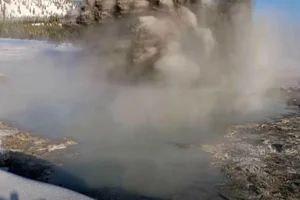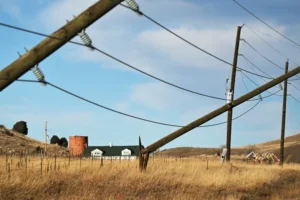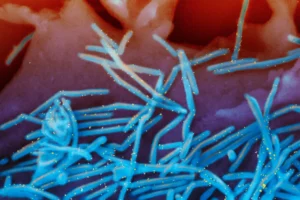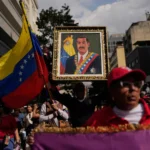Investigation Finds At Least 973 Native American Children Died in US Government Boarding Schools
- Published In: Other News & Features
- Last Updated: Jul 31, 2024
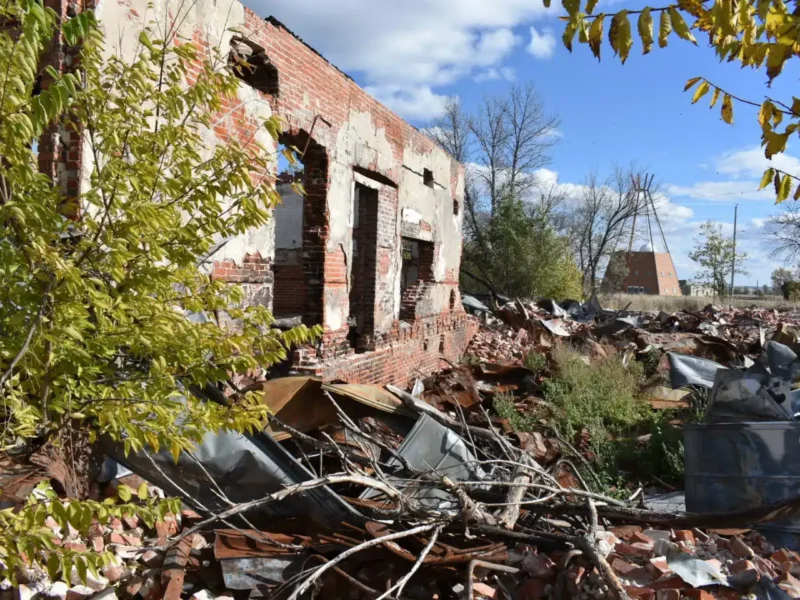
The ruins of a building that was part of a Native American boarding school on the Rosebud Sioux Reservation in Mission, S.D., are show here Oct. 15, 2022. Federal officials with the Interior Department called on the U.S. government Tuesday, July 30, 2024, to apologize for a nationwide system of boarding schools in which Native children faced abuse and neglect. (AP Photo/Matthew Brown, File)
By MATTHEW BROWN
BILLINGS, Mont. (AP) — At least 973 Native American children died in the U.S. government’s abusive boarding school system, according to the results of an investigation released Tuesday by Interior Department officials who called on the government to apologize for the schools.
The investigation commissioned by Interior Secretary Deb Haaland found marked and unmarked graves at 65 of the more than 400 U.S. boarding schools where Native American children were forcibly assimilated into white society. The findings don’t specify how each child died, but officials said the causes of death included disease and abuse during a 150-year period that ended in 1969.
Additional children may have died after becoming sick at school and being sent home, officials said.
The findings follow a series of listening sessions held by Haaland over the past two years in which dozens of former students recounted harmful and often degrading treatment they endured at the hands of teachers and administrators while separated from their families.
“The federal government took deliberate and strategic action through boarding school policies to isolate children from their families, deny them their identities, and steal from them the languages, cultures, and connections that are foundational to Native people,” Haaland, a member of the Laguna Pueblo tribe in New Mexico and the country’s first Native American Cabinet secretary, said in a Tuesday call with reporters.
“Make no mistake,” she added, “This was a concerted attempt to eradicate the quote, ‘Indian problem’ — to either assimilate or destroy native peoples altogether.”
In their initial findings two yeas ago, officials had estimated more than 500 American Indian, Alaska Native and Native Hawaiian children died at the schools. The federal government passed laws and policies in 1819 to support the schools, which were still operating in the 1960s.
The schools gave Native American kids English names, put them through military drills and forced them to perform manual labor, such as farming, brick-making and working on railroads, officials said.
Former students shared tearful recollections of their experience during the listening sessions in Oklahoma, South Dakota, Michigan, Arizona, Alaska and other states. They talked about being punished for speaking their native language, getting locked in basements, and having their hair cut to stamp out their identities. They were sometimes subjected to solitary confinement, beatings and the withholding of food. Many left the schools with only basic vocational skills that gave them few job prospects.
Donovan Archambault, 85, the former chairman of the Fort Belknap Indian Reservation in Montana, said beginning at age 11 he was sent away to boarding schools where he was mistreated, forced to cut his hair and prevented from speaking his native language. He said the experience led him to drink alcohol heavily before he turned his life around more than two decades later. He never talked about his school days with his children until he wrote a book about the experience several years ago.
“An apology is needed. They should apologize,” Archambault told The Associated Press by phone Tuesday. “But there also needs to be a broader education about what happened to us. To me, it’s part of a forgotten history.”
Haaland said she was personally “sorry beyond words,” but there should also be a formal apology from the federal government. She didn’t say if she would press President Joe Biden to issue one.
Interior Department officials also recommended that the government invest in programs that could help Native American communities heal from the traumas caused by boarding schools. That includes money for education, violence prevention and the revitalization of indigenous languages — on a scale commensurate with government spending on the schools, agency officials said.
The schools, similar institutions and related assimilation programs were funded by $23.3 billion in inflation-adjusted federal spending, officials determined. Religious and private institutions that ran many of the institutions received federal money as partners in the campaign to “civilize” Indigenous students, according to the new report.
By the 1920s, most Indigenous school-age children — some 60,000 children — were attending boarding schools that were run either by the federal government or religious organizations, according to the National Native American Boarding School Healing Coalition.
“These are stolen generations of children,” said Deborah Parker, CEO for the Minnesota-based group. “It’s about time the federal government speak so honestly and candidly about the impact.”
Haaland said her own grandparents were “stolen from their parents, culture and communities” when they were 8 years old and forced to live in a Catholic boarding school until they were 13. Others who went to schools were as young as 4, she said.
More than 200 schools supported by the government had a religious affiliation, federal officials said. The boarding school coalition has identified more than 100 additional schools not on the government list that were run by churches, with no evidence of federal support.
U.S. Catholic bishops in June apologized for the church’s role in trauma the children experienced. And in 2022, Pope Francis apologized for the Catholic Church’s cooperation with boarding schools in Canada. He said the forced assimilation of Native peoples into Christian society destroyed their cultures, severed families and marginalized generations.
Legislation pending before Congress would establish a “Truth and Healing Commission” to further document past injustices related to boarding schools. The legislation would give the commission authority to subpoena people for evidence.
But Catholic bishops pushed back against giving that subpoena power in a letter to lawmakers last week. Members of the U.S. Conference of Catholic Bishops wrote that the commission should “avoid an adversarial posture” since they are willing to cooperate.


